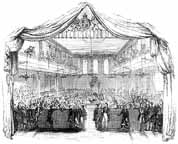The Reform Bill [of 1832] was not calculated materially to improve the general composition of the Legislature. The good it has done, which is considerable, chiefly in this, that, by being so great a change, it has weakened the superstitious feeling against great changes. — John Stuart Mill, “Coleridge”
Disenfranchisement Clauses
- 56 nomination or rotten boroughs returning 111 MPs lost their representation
- 30 boroughs with less than 4,000 inhabitants lost one MP each
- Weymouth and Melcombe Regis gave up two of their four MPs

The First Reformed Parliament. 1843.
Enfranchisement
- 65 seats were awarded to the counties
- 44 seats were distributed to 22 larger towns including Birmingham, Manchester, Leeds, Sheffield and the new London metropolitan districts
- 21 smaller towns were given one MP each
- Scotland was awarded 8 extra seats
- Ireland was given 5 extra seats
Franchise Qualification
The borough franchise was regularised. The right of voting was vested in all householders paying a yearly rental of £10 and, subject to one year residence qualification £10 lodgers (if they were sharing a house and the landlord was not in occupation).
In the counties, the franchise was granted to:
- 40 shilling freeholders
- £10 copyholders
- £50 tenants
- £10 long lease holders
- £50 medium lease holders
- Borough freeholders could vote in the counties if their freehold was between 40 shillings and £10, or if it was over £10 and occupied by a tenant.
Related Materials
- Reform Acts: An Introduction
- The Reform Act Crisis
- How Did the Tories Recover after the 1832 Reform Act?
- The Bristol 1832 Reform Bill Riots
Last modified April 1997
Epigraph added 15 July 2019